Prayer for the Living Read online
Page 2
I couldn’t see the bearing it had on our discussion.
‘I can’t marry you,’ she said, lifting up her eyes as if she saw through the roof of her adobe house to something bright and iconic in the mountains.
‘Why not? I am a man.’
‘You are not of my blood. You are not pure. I can only marry a man with pure Inca blood.’
‘But why?’
‘That is how it is. That is how it has been for a thousand years.’
‘But all your men are gone. They’re in the cities. You said yourself that when they go to the cities they don’t come back.’
‘I know.’
‘I am a man. Marry me and have children and your sadness will vanish.’
She smiled for the first time. But the smile was somehow sadder than her sadness.
‘I can’t. That is how it is. For a thousand years that is how it is.’
‘But what will you do? Would you rather have no children or children with someone like me? Can you not change a little?’
‘I can’t,’ she said.
Then with a slight movement of her shoulder, the conversation was over. She was very beautiful. I stood there speechless for a while. Then I felt a veil descend between us. It was like the coming of night in the mountains. It comes suddenly as you are walking the trail. The next moment, if you are not careful, you walk right off the edge of the mountain. That’s how it came between us. I could not see her anymore through the veil she brought between us.
Somewhat broken, I concluded our tour. As we left I said goodbye to her. She stood still in the corner and did not move. She did not respond to my farewell.
Why am I telling you this? I don’t know. But this room here on Machu Picchu is just like the room we were in. It reminds me of her. It brings back to me all the force of her sadness. I can feel it now.
Please excuse me. We shall resume our tour. I’ll be back shortly.
A Sinister Perfection
She had always wanted a doll’s house. As soon as she was old enough, Hyacinth asked her parents for one. Her mother was doubtful; she thought it would distract her daughter from real life. Her father felt it could provide a useful education in running a house. He was so taken with this notion that he had a doll’s house commissioned at once.
He wanted it to be gigantic and the exact replica of their own house on Baker Street. His precise instructions required a fiendish architect. When it was delivered, he found its replication perfect in scale and detail. Hyacinth was so fascinated that she spent hours comparing it with the original.
She spent most of her time making the doll’s house as like their real house as possible. She filled it with her imagination. She slept and woke in one of its rooms. In another of its rooms lived Mum and Dad. The kitchen below, the servants’ room at the back, were all living places in her mind.
It occurred to her that what happened in the doll’s house had a magical effect on what happened in the real house. When she wished someone to be ill in the doll’s house, someone fell ill in the real one.
She continued in this game till one day she imagined a stranger paying a visit to their house. She imagined him a peddler of stones and magic lamps that she had read of in books. Then a week later such a stranger, just like the one she had imagined, knocked on their door. He stood in the gaslight, a peddler of blue stones. The servants were about to send him away, but Hyacinth begged her father to let him in. He had piercing eyes and wore a red turban. He was from Kazakhstan and had walked the Silk Road. When he stepped into the living room and saw the doll’s house, he said:
‘It is just as I dreamt it.’
‘What on earth do you mean?’ her father said.
‘I had a dream of such a house.’
‘Do you mean the doll’s house?’
‘Yes. Your daughter summoned me here. I have come. What do you want of me?’
‘Can you make the little house come alive?’ Hyacinth asked.
The stranger turned his fierce blue eyes on her.
‘The little house lives!’ the stranger said, placing a blue stone in Hyacinth’s palm.
Before the father could protest, the stranger was gone.
*
From then on the doll’s house teemed with invisible activity. Little beings lived and fretted in there within its lighted windows. Hyacinth listened to the whispers in the little house till her eyes grew red with exhaustion. At night when everyone was asleep she would steal downstairs and pay keen attention to the muted activity in the house. Often she would be found asleep in front of it and would be carried back to bed without waking. She began walking in her sleep, stealing downstairs to where the real life was, in the doll’s house.
In her dreams, she was the mistress of the house. She gave orders to an army of servants. In one dream her father was in jail. In another her mother was banished to the country. She would wake up horrified. Not long afterwards bailiffs came to the house and arrested her father on charges of financial irregularity. Her mother fell on a riding trip in the country, broke her ankle, and was confined to bed for several weeks.
Hyacinth had the big house to herself. She didn’t think for a moment that the doll’s house had anything to do with these unhappy incidents. Now that she was mistress of the house, she succumbed to its power and her character changed. She became imperious.
One night the invisible beings invaded the real house. She saw them filing out of the little house and she screamed. No one believed her. She grew hysterical and the servants locked her up in her room till they could get the doctor out to look at her.
During that time the invisible creatures occupied the big house. They roamed about in the pantry. They clambered about in the living room. At night Hyacinth could hear them whispering about fire.
‘With a divine fire,’ she heard one of them say, ‘we’ll burn down this house.’
‘And in three days it will be rebuilt again.’
‘By the Architect.’
‘With his runes.’
‘Which he studies while the world burns.’
‘Out of the ashes the great house will rise.’
‘And the young girl will have learned her lesson.’
‘Yes, the lesson of perfection.’
That was when it occurred to her that their house had become the doll’s house, and that their lives were in peril. She called out to the servants, she tried to warn them, but they would not listen. She heard them whispering in the corridor. She could have sworn they were drunk.
That night something caught fire in the pantry. The blaze spread. There is no need to say that the house was burned down, and that they were ruined. There is no need to state either that when the house burned down only the doll’s house, in its sinister perfection, remained miraculously intact. No one knows what became of it.
Her father was released from jail. The charges against him were found to be ridiculous. Many suspect the charges were trumped up by rivals who envied his success.
They moved to a small house in the country. Her mother sold off all her horses and never rode again. Her father learned to read and interpret runes. Day after day, Hyacinth waited for the stranger to return, so she could give him back his blue stone.
Ancient Ties of Karma
A stoku
It was a clear bright day. Two men were about to fight a duel. One had a long knife. The other had a short sword curving sharply at the end. The one with the knife was younger, cockier, and wild. He was very sure of himself. The one with the curved sword was older, more civilised, and did not want to fight. He had done everything to avoid it. But the younger man forced his hand.
They had the first of their duels.
It began in a flash. One made a move, the other ducked, and the younger plunged the knife into the older man’s chest. This was in a shadow realm.
Then the friends travelled on. They walked through many landscapes, traversed many cities. Outside a railway station they had another flash fight. The one moved, the o
ther ducked, and the younger one planted the knife in the older one’s chest. This was in a realm of thought.
The two men, bound together by mysterious ties, journeyed on. Travelling together had not resolved the bad blood or the fated mood between them.
The day of doom arrived. Fate had given them time to overcome their differences, and they hadn’t. The older one never provoked. He was bound to the younger one by ancient ties of karma. They came to a village in the woods. It was near a cemetery. They were now in real time.
The younger one provoked, and attacked. The older one ducked, and desultorily stabbed his weapon at the younger one who made an evasive movement. Then he planted his long knife deep into the belly of the older man and watched the blood pour out. This was real.
The younger one was not satisfied with his victory. He was outraged at the older fellow’s poor technique. While the older man stood with the knife sticking out of him, his blood draining to the ground, the younger one gave him a masterclass.
He replayed their moves triumphantly.
‘You made a thrust. I moved sideways. The knife went between arm and body. Then I delivered the coup de grâce.’
But then the older man suddenly came to life. He made extraordinary movements, faster than the wind, swifter than thought. He made three slashing cuts and brought the sharp, curved end of his weapon down on both sides of the younger one’s neck, without touching him.
They were master strokes. The older man could have killed the younger man whenever he wanted. It became evident that the older man was the master all along. He had deliberately refrained from killing the younger man.
Then something bizarre happened. Events in the real world caught up with the truths of the shadow world. The younger man fell as if he had been struck fatally. He fell against the wall. As he sank to the ground, he cried:
‘Hell has opened for me.’
Right next to him a monkey’s head, yellow and red, projected from the wall. The younger man let out a barely audible Don Giovanni wail as he was snatched down to the underworld.
The older man, accompanied by the melody of the stars, was swept up to heaven.
Dreaming of Byzantium
‘… and gather me
Into the artifice of eternity.’
W. B. YEATS
For a long time he had been trying to go to Byzantium. He had started the journey many times. For twenty years, he had been setting out at the same time of year. But whenever he set out the journey always became complicated. On one occasion he found himself in another city without knowing how he got there. The journeys took on a life of their own. They took him not where he wanted to go, but where the journeys themselves wanted.
The desire to go to Byzantium represented to him something of an impossibility. Every year he would get out his maps and study all the routes by which to get there. He dreamt of long train journeys, considered walking, and was even tempted to try the obscure method of being borne there by birds. Nothing seemed too excessive for accomplishing a task that fate had made difficult.
The years passed and the journey had not been made. He had amassed a collection of photographs and drawings, paintings and lithographs and engravings. He had read poems and travel journals, sought out travellers’ tales and ancient legends. He had approached Byzantium as one approaches the stories of a famed kingdom beyond seven mountains. Only rare travellers return from it with gold-rimmed eyes. He had approached, but had been unable to find the gate by which to enter.
Every poem he had read about it was a closed castle, every drawing a hieroglyph, and each traveller’s tale a riddle. He had begun to think that Byzantium existed in a separate world, a world of blue dragons and topaz lions.
He had kept his hopes for this journey to himself. He never demeaned his dream by telling it to anyone. Byzantium was his secret destination. He felt in some ways that it was his destiny.
2
Many years ago he had actually received an invitation to go to Byzantium. It was as if fate wanted to tempt him with that which he sought but could not have. He was invited to be on a panel of image-interpreters. The letter of invitation had puzzled him. Its formality, its circuitous language, made it seem as if it were addressed not to an individual, but to a group. He responded to the letter diligently and awaited a reply. A date had been given for the conference, which was to take place in the ancient capital, on the shores of the Bosphorus.
He thought that at last the closed gate of his dream was beginning to open, that the fates had been appeased. He had fallen under the spell of an ancient legend. There is a place that each person cannot go to. And if they do, a mysterious fate awaits them. Everyone has a Paris inaccessible to them, a Rome they will never arrive at, a forbidden Lagos. The key to that place is held by one of the three sisters of fate.
The invitation seemed a sign that the key had been turned in its lock. He dreamt of white swans on the bright river. Once he dreamt of a black swan and awoke perplexed. What might happen to him now the spell was broken?
Places that we have failed to get to exert a profound fascination. It could be the next village, a museum in the city, an alleyway just off your street. Or a letter one is waiting for that never arrives.
That they never replied to his letter, or that their reply got lost in the post, only confirmed that the key opening the door of his destiny had not really been turned. He waited weeks, then months, for a response. He wrote several times. He heard nothing. It was as if fate were playing a game with his fondest hopes. But the game fate played only deepened his desire.
Desire increases in direct proportion to obstacles preventing its fulfilment. Some might think that the desire is the obstacle. None of this crossed his mind. When the opportunity to visit Byzantium faded, he went back to making plans, studying maps, and consulting ancient books in libraries about the weather there. Byzantium became a living place in his imagination. Is there anything more real than what we have created in our minds, with all the power of our imagination and ignorance?
Every day he went to this place that was on the margins of his mind. This place existed alongside his daily work, his everyday tasks. At night he inhabited this realm. He dwelled in its markets and its mosques, its parks and its cathedrals. He wandered on the roads that led to the river. The muted evening light over the city and the eastern origins of its language became his constant delight.
All he had to do was shut his eyes and he was there again. It was what he looked forward to most. For months he lived like this, in the two realms. His daily life meant less to him than his dream life. As his daily life grew more confined, this dream life acquired more liberty. Slowly he became a shadow in the city where he lived. The world ceased to notice him. He passed into daily insubstantiality. But in his dreams he acquired form and body and freedom.
He developed growing mastery of this secret domain. As he lost the city of the day, he gained the city of his dreams.
3
One day he had gone for a walk in his neighbourhood, along the canal, in west London. It was an unusually cold day and at the end of the walk he had taken refuge in a café. At that time of day the café was usually empty. Steam from a coffee machine misted the windows. He took a seat near a window and stared out into the misty world. He liked the world misty. He liked the world unclear.
While he had been sitting there, his mind empty, a man had come into the café and taken a seat at the table next to him. After a while the man addressed him, in a voice that had the hollow quality of a cave.
‘I see that you like the world misty,’ he said.
‘I do.’
‘Too much reality, eh?’
‘The world seems unreal.’
‘What is real for you?’
‘Far-off places that I cannot get to, dreams more real than fire.’
‘So you too are haunted by unattainable dreams?’
He turned to look properly at the stranger. He noted the darkness of his eyes and the strangeness of his dres
s. He wore a blue-red robe and a gold fringed turban and white shoes that curved upwards at the tip. He seemed like one who had come from a place where the air is of fire and where the eyes see nothing but stone. His face was hard and sculpted like rocks in wild places. From his robe came the elusive odour of the desert and of eastern marketplaces. From his eyes came the hint of unpredictability.
‘Why do you say that?’
‘I recognise the curse of those who are trapped in their dreams.’
‘How can you recognise it? What do you do? Who are you that you can say such things?’
The stranger was silent. He had the air of a wandering magician. He could even have been a wizard. It was those piercing eyes. They saw through illusion. The stranger laughed. He had good teeth.
‘What I do does not matter.’
‘What matters then?’
The stranger smiled, got up, and with deliberate motions put on his white gloves. Then he left without another word. When the stranger left, the mood of the café was different. It was muggier than before.
He sat at the window, no longer looking out. The window was no longer misted.
4
Every now and then we meet someone who seems to have the solution to that which perplexes us. We sense they have the solution even before they have spoken. It is as if they are the key that the universe has sent us. He sensed from their only meeting that the stranger might be his key.
He went back to the same café, and sat at the same window, hoping to meet the stranger again. He had many questions for him. He waited at the same place, and at the same time, for weeks. Before he sat down and ordered his cup of tea, he knew he would not see the stranger that day. Each day he knew it. He knew it sometimes by the shapes that formed on the misted windows. Sometimes he knew it from the vacant mood of the café, even when the café was full.
It is said that certain people, with the force of their charisma, change the mood in a room. They don’t have to be important. They might appear insignificant. Do certain people foreshadow their arrival? Even the most sceptical people, going for a walk, have sometimes had the sense of a friend they have not seen for a long time. They turn a corner and there, at a bus stop, stands the friend. Do we sometimes sense people before we meet them?

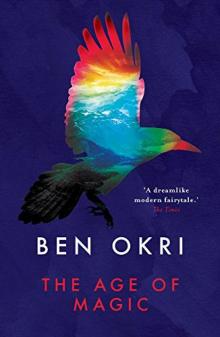 The Age of Magic
The Age of Magic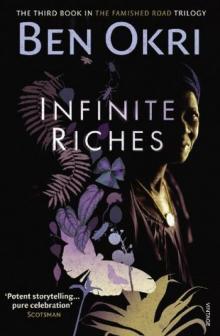 Infinite Riches
Infinite Riches Songs of Enchantment
Songs of Enchantment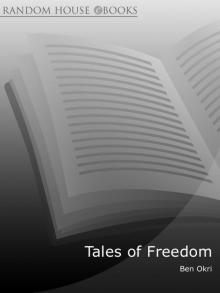 Tales of Freedom
Tales of Freedom Dangerous Love
Dangerous Love Starbook
Starbook The Famished Road
The Famished Road Astonishing the Gods
Astonishing the Gods A Fire in My Head
A Fire in My Head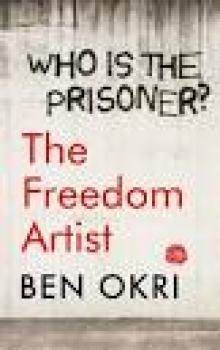 The Freedom Artist
The Freedom Artist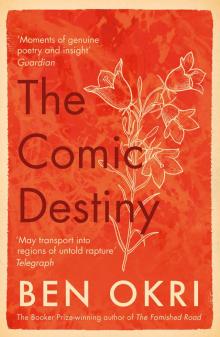 The Comic Destiny
The Comic Destiny A Way of Being Free
A Way of Being Free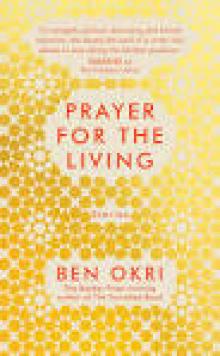 Prayer for the Living
Prayer for the Living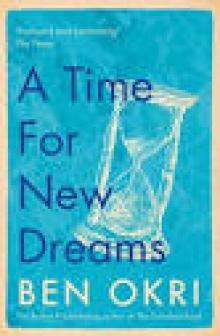 A Time for New Dreams
A Time for New Dreams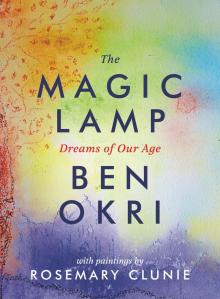 The Magic Lamp
The Magic Lamp In Arcadia
In Arcadia